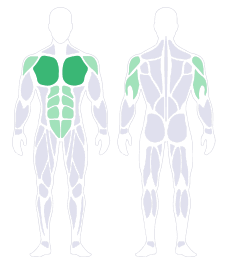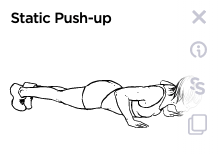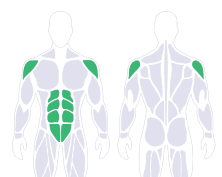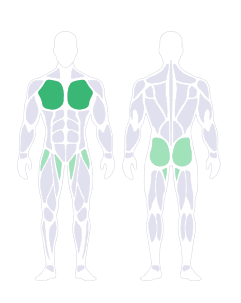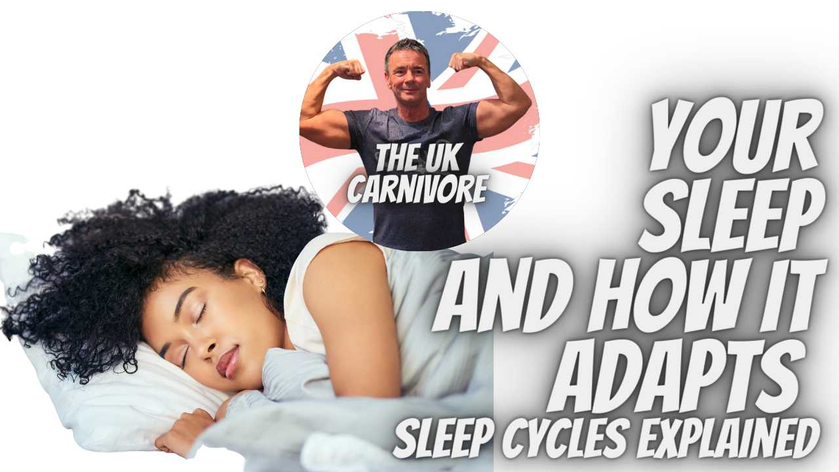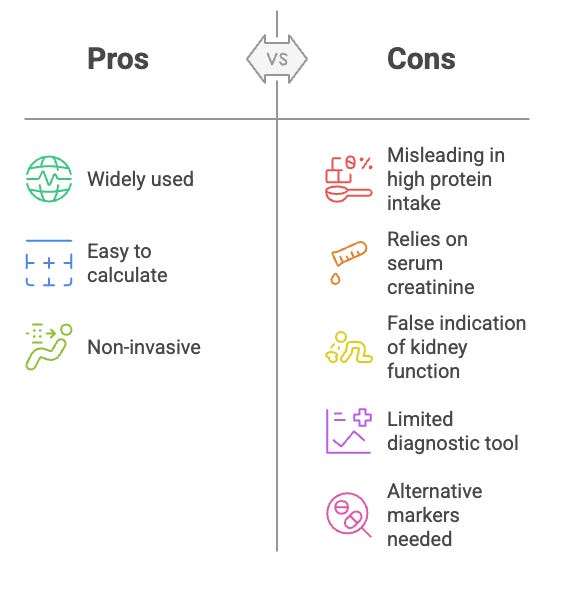Sleep, what it does and how it does it!
Good day meat eaters. Sleep is essential to good health, we all know that. But how does sleep work to repair and improve your health? Here's some science.
First things first. Sleep is essential for repair and recovery but there is no scientifically proven amount of sleep that EVERYONE must obtain. In studies it is often concluded that it is not the duration that is the most important factor to 'a good night's sleep' but the quality of the sleep that matters most. With 35 percent of adults sleeping for under 7 hours each night, according to the American Sleep Association.
Studies demonstrate that sleep is incredibly complex and has effects on virtually all systems of the body
https://www.ninds.nih.gov/health-information/public-education/brain-basics/brain-basics-understanding-sleep
Deep sleep, often known as rapid eye movement sleep appears to be the most beneficial part of the sleep cycle. Let's take a deep dive into sleep. Now stay awake!
Sleep, serotonin and melatonin
Studies demonstrate that sleep is incredibly complex and has effects on virtually all systems of the body
https://www.ninds.nih.gov/health-information/public-education/brain-basics/brain-basics-understanding-sleep
Almost within just 60 seconds of falling asleep your body and brain exhibit changes in their physiology. Your temperature drops, heart rate and breathing slow down and your energy expenditure drops proportionally https://pubmed.ncbi.nlm.nih.gov/21059762/
But one surprising area of the body that will also experience a ramping down of activity is the brain, many people use a phrase to describe just before falling asleep as, ‘their mind was racing,’ but it seems it quickly slows down. So as everything quietens and slows we are at the beginning of the ‘sleep cycles.’ The appropriately named stage 1 will last for as long as 120 minutes or as little as 70 minutes. Now to digress and explain the 4 cycles, also known as 4 stages, in more detail. These four sleep stages are fundamental to how sleep works.
https://www.ncbi.nlm.nih.gov/books/NBK526132
http://healthysleep.med.harvard.edu/healthy/science/what/sleep-patterns-rem-nrem
The Sleep Stages Explained
There are four stages of sleep and the first three stages fall into the category of non-REM (rapid eye movement) sleep. The fourth stage is REM sleep.
NREM, Stage 1, duration of 1-5 minutes
NREM, Stage 2 lasts 10-60 minutes
NREM, Stage 3, (Slow-Wave Sleep ((SWS)), Delta Sleep, Deep Sleep) lasts for between 20 to 40 minutes
REM, Stage 4, REM Sleep lasting around 10 to 60 minutes
http://healthysleep.med.harvard.edu/healthy/matters/benefits-of-sleep/learning-memory
Let's go through the stages one-by-one to make it clear what’s going on. Remember the first 3 stages are all non-rapid-eye-movement sleep (NREM.) This initial stage happens when you have just gone to sleep (not just gone to bed, but actually fallen asleep.) This first stage lasts around 60 seconds to 5 minutes. Your body is already preparing to get to the second stage by slowing down brain and body activity. You now enter stage 2 and this can last for 10 minutes to as long as an hour. You can very easily be awoken from this stage, which many people find frustrating. All body activity is slowed.
We now enter stage 3, which has many aspects to it. The stage also known as N3 consists of Slow-Wave Sleep (SWS), Delta Sleep and Deep Sleep. This is the deepest part of NREM sleep. In this stage, your brain activity is very different to activity when you are awake. This is the time your brain appears to be working on memory and effective thinking. It is also thought that much recuperation happens during stage 3 which lasts between 20 to 40 minutes. Once this has ended, we now have finally entered stage 4.
Rapid-eye-movement sleep (REM) happens only at Stage 4. As expected the brain activity increases markedly and only the eyes and breathing escape a temporary paralysis. It is now that intense dreams happen, dreams can happen at any stage but stage is the most intense. Bigger portions of REM sleep happens during the second half of the night. It is believed to be essential for the brain to experience this REM sleep to assist with learning and memory.
How do we know when to sleep?
We probably all know the feeling of ‘boy I need to get some shut-eye’, and if you have experienced this it will help when explaining what is actually going on. It does seem simply intuitive, and that’s because it is. The fancy-pants term for this is the homeostatic sleep drive. The study that best describes this sleep drive is entitled
Sleep Drive Is Encoded by Neural Plastic Changes in a Dedicated Circuit
You can read that here https://pubmed.ncbi.nlm.nih.gov/27212237/
Or you can let me explain it more simply. The pressure you feel to sleep builds up the longer you are awake. There you go, simple. Normally if you have three or four nights in a row of poor sleep at some point your body plays ‘catch-up’ and you sleep for longer than normal. Next we have our response to such things as how light it is outside and our daily routines. It’s technically known as the circadian rhythm. Which elegantly runs over a roughly 24 hour period and repeats. Exposure to light plays the biggest role. Once darkness sets in, the production of melatonin increases. Other factors that disturb sleep are caffeine intake, stress, hunger and use of devices such as mobile phones and tablets.
Magnesium
Here are some simple truths about magnesium. Many people swear by magnesium to help them sleep or to relieve cramps. But what is magnesium and why does it work for so many folk?
If you take an anti-acid this lowers magnesium uptake, you need an acidic stomach for proper absorption of this mineral. Salt is needed to keep the stomach acidic so don't fear salt.
The adult body has 25 grams of magnesium of which 50-60% is the bones and most of the rest is in soft tissue. Here are some important facts regarding magnesium.
It's tightly regulated and controlled.
Less than 1% is in the blood serum.
120mg per day is excreted in the urine.
Supplements.
Not all magnesium supplements are created equally. Here is a rough guide to the types of magnesium and what they assist.
Threonate (Brain)
Glycinate (Relaxation)
Taurate (Muscles)
Chloride (Over-all)
Malate (Similar to Chloride but cheaper)
Glutamate & Aspartate (Nervous system stimulating)
Citrate (Stimulates the bowl but too much equals too much 'stimulation' and that thunder rolls)
Oxide (Cheap and pointless)
Magnesium threonate. )For brain function. Increases synaptic density)
Magnesium is normally bound with something and the supplement Mag oxide is not easily absorbed (about 4% of the total it seems is.) Some people like to try it topically especially if you can't tolerate mag well.
Magnesium in general
Doesn't seem to be contraindicated. Unless you have a specific kidney disease
It is an electrolyte—a substance that ionizes to become a particle with positive or negative charges—
Book reference. Harper, David G. . BioDiet: The Scientifically Proven, Ketogenic Way to Lose Weight and Improve Your Health (p. 145). Page Two. Kindle Edition.
Magnesium Citrate (salt or ester of citric acid) (ester Glycerides, which are fatty acid esters of glycerol, are important esters in biology, being one of the main classes of lipids, Ester names are derived from the parent alcohol and the parent acid, where the latter may be organic or inorganic. Esters derived from the simplest carboxylic acids are commonly named according to the more traditional, so-called "trivial names" e.g. as formate, acetate, propionate, and butyrate.
Good for nocturnal leg cramps
Constipation
Absorbs readily
Prevents headaches
Magnesium Glycinate (mag + glycine) Recap of Benefits
Calming, sleep and anxiety helped
Anti-inflammatory
Supports blood sugar management
No laxative effects
I'm not a big fan of supplements, however some people do take a magnesium supplement (small doses spread throughout the day) as per the influencer Dr. Anthony Jay's advice. Some claim that it does help them sleep and reduces their frequency of urination. However, if you take Magnesium carbonate you'll be running to the bathroom a lot with diarrhea.
References and Studies
Randomized Controlled Trial
2010 Dec;23(4):158-68. doi: 10.1684/mrh.2010.0220. Epub 2011 Jan 4.
Magnesium supplementation improves indicators of low magnesium status and inflammatory stress in adults older than 51 years with poor quality sleep
Forrest H Nielsen 1, LuAnn K Johnson, Huawei Zeng
PMID: 21199787
DOI: 10.1684/mrh.2010.0220
https://pubmed.ncbi.nlm.nih.gov/21199787/
Randomized Controlled Trial
J Hum Hypertens 2009 Apr;23(4):245-51. doi: 10.1038/jhh.2008.129. Epub 2008 Nov 20.
The effect of lowering blood pressure by magnesium supplementation in diabetic hypertensive adults with low serum magnesium levels: a randomized, double-blind, placebo-controlled clinical trial
F Guerrero-Romero 1, M Rodríguez-Morán
PMID: 19020533
DOI: 10.1038/jhh.2008.129
https://pubmed.ncbi.nlm.nih.gov/21199787/
